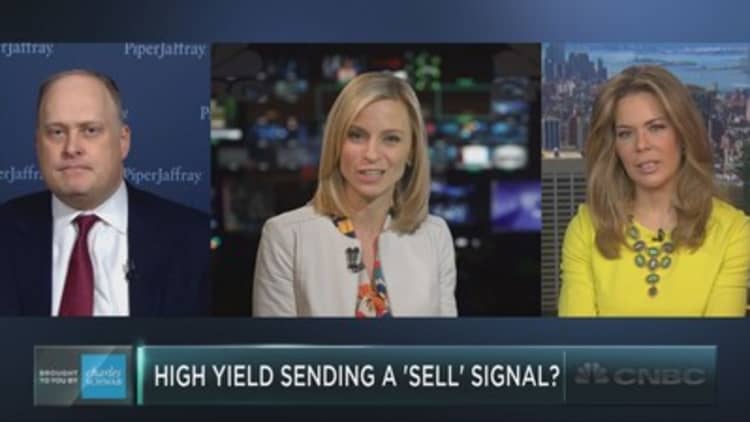
A recent divergence between high-yield bonds and the stock market could point to trouble for risky investments, according to one strategist.
With the relatively steady in the last week, the HYG high-yield bond ETF has taken a leg lower, which could be an omen.
The S&P and HYG tend to move in tandem; high-yield "junk bonds" often trade more like equities than higher-grade Treasury bonds. They carry substantially more risk than government-issued Treasurys, and are connected to the strength of the company that issues them.
The recent separation over the last week or so could be an indication that investors are digesting the rising expectation that the Federal Reserve will raise its federal funds rate next week "therefore pushing the recent extreme demand for high- yield bonds down," said Erin Gibbs, S&P Global's equity chief investment officer.
"Investors had been piling into high-risk bonds as investors have taken increasing riskier positions during stable market conditions. Defaults have been falling and are expected to hold steady," Gibbs told CNBC on Tuesday.
High-yield bonds are sending signals in particular about communications, consumer and energy sectors, Gibbs added. These sectors are the top-weighted stocks in the HYG.
From a technical perspective, the divergence is not particularly worrisome in a rising-rate environment, said Piper Jaffray senior technical strategist Craig Johnson.
Johnson noted that historically, such a divergence between the S&P 500 and the HYG is not abnormal when the market is anticipating an interest rate hike. And typically, a sort of "catch-up" takes place and the stock market resumes higher if a brief sell-off does in fact take place.
"So I really think this is more of a short-term adjustment, and what we see is HYG starts acting like a bond, like it typically is, and you see that kind of quick sell-off," Johnson said Tuesday on CNBC's "Trading Nation."
If such a divergence occurred in an environment in which investors were not faced with the Federal Reserve's likelihood of raising interest rates, then Johnson would be concerned, but not right now. This is just "the high-yield bond market acting like a bond at this point in time," he said.





